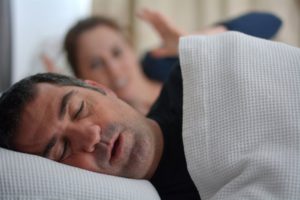
You inherit a lot of things from your parents; your hair and eye color are two notable features that come to mind, but did you also know that you can inherit certain conditions from them as well? Believe it or not, one of these conditions is actually sleep apnea! Here’s more from your sleep dentist in Topeka about how your genes can contribute to this condition along with some ways that you can lower your risk.
How Can My Genes Contribute to Sleep Apnea?
To put it shortly, obstructive sleep apnea (OSA) is a chronic condition that’s characterized by repeated pauses in a patient’s breathing throughout the night. These pauses are caused by blockage in the airway, often due to the soft tissues of the mouth and throat collapsing. While this blockage can stem from a variety of reasons that are lifestyle-related, it can also stem from your genes! Here are a few ways how:
- Body fat – Your genes can greatly impact your body weight and also determine where fat is located on your body, both of which can influence your likelihood of developing sleep apnea. In fact, people who are obese are roughly ten times more likely to suffer from OSA.
- Facial anatomy – Your genes also affect the shape of your face, including skull width, nose length and width, and facial depth. All of these parts impact how wide your airway is, which in turn influences how easily it can become blocked.
- Circadian rhythm – Your innate sleep schedule is heavily influenced by your genes, as is how well you sleep.
- Breathing control – Research on the link between genes and breathing control is still somewhat lacking, but experts suspect that genetics might influence the muscles and neural signals that are involved in breathing.
What Can I Do to Lower My Risk of Sleep Apnea?
Even if you’re genetically predisposed to sleep apnea, there are still several things you can do to actively lower your risk of developing it. Consider the following tips:
- Try to maintain a healthy weight by eating a vitamin-rich diet, avoiding excess sugar and unhealthy foods, and getting plenty of exercise.
- Make other lifestyle choices that promote healthy breathing during sleep, such as not drinking alcohol in excess before bedtime or smoking and using tobacco products.
- Be mindful of other potential sources of sleep disruption such as light entering the room, warmer temperatures, pet dandruff, seasonal allergies, and more.
- If you suffer from dental misalignment, oral appliance therapy can assist with correcting your jaw’s position, resulting in better airflow. You might also consider sleeping on your back rather than your side to promote easier breathing.
Just because your sleep apnea is tied to genetic conditions doesn’t mean you’re helpless against it! If you’re concerned about how sleep apnea might be impacting your ability to rest, don’t hesitate to speak with your dentist about possible solutions.
About the Author
Dr. Michael E. Michel received his dental doctorate from the University of Missouri-Kansas City School of Dentistry and has proudly served patients and families in the Topeka area since 1981! His practice is pleased to offer a wide range of services including sleep apnea therapy. If you have any questions about sleep apnea or would like to schedule a consultation, you can contact Dr. Michel’s practice online or over the phone for assistance: (785) 273-0802.
